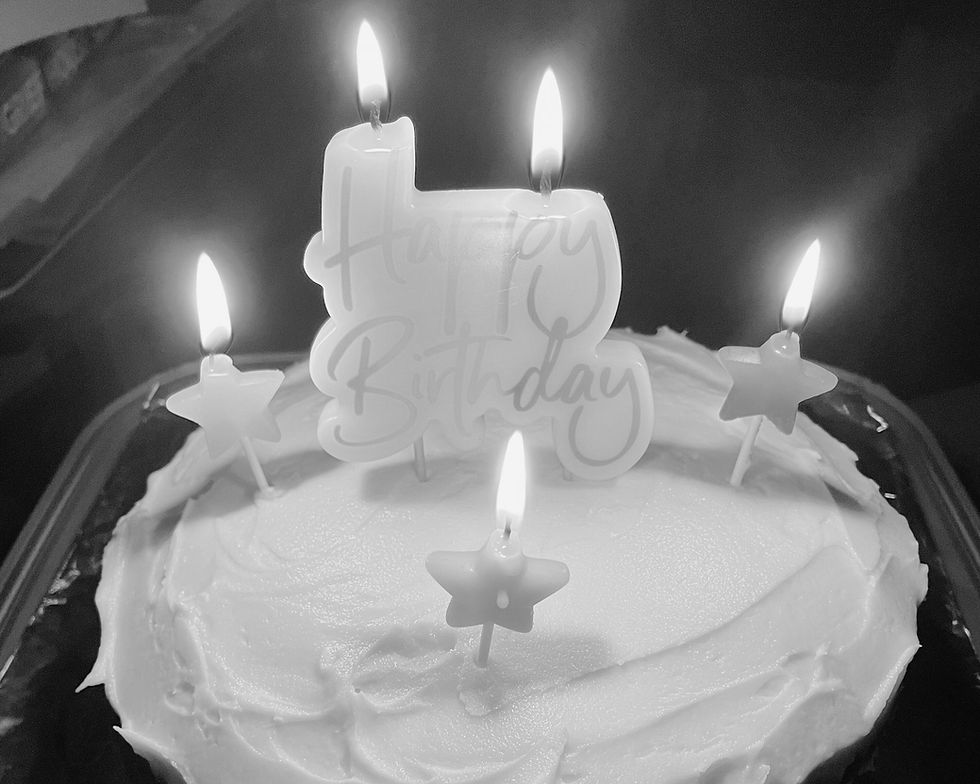Why Birthdays Can Be Bittersweet for Adult Adoptees
- Lynn Earnshaw

- Sep 2, 2025
- 4 min read
Updated: Nov 19, 2025
For many adult adoptees, birthdays can carry both celebration and grief. This post explores why the day may feel difficult and how it can be reclaimed.

For many people, birthdays are a time of celebration: a day to be surrounded by love, cake, laughter, and messages from friends and family.
But for some adult adoptees, birthdays can stir up a complex blend of emotions - sadness, confusion, anger, or even numbness.
If this is your experience, you are not alone. For many adopted people, particularly those relinquished at or soon after birth, birthdays can feel like a spotlight on loss, identity, and unanswered questions.
As an adoptee myself, I know this mix of feelings well. Over the years, I have found comfort in celebrating with those closest to me, while also noticing the quieter emotions that birthdays bring.
In this post, I’ll explore some of the reasons birthdays may feel difficult for adoptees, especially those relinquished at birth, and share gentle ways they might be reclaimed.
The Day of Birth and Separation
For some adoptees, the birthday is more than just a personal anniversary. It can also represent the beginning of separation.
Even when relinquishment did not happen exactly at birth, the date itself symbolises the starting point of disconnection. It is the day a life began and the day that life was changed forever.
A Complication Rather Than a Celebration
A birthday may also stir up a sense of having entered the world as a complication rather than a celebration. For some adoptees, this sits beneath the surface as a quiet, painful echo that lingers long after childhood.
Rather than feeling joyful, the day can carry an undercurrent of grief — especially if the adoptee has little or no information about their birth parents or the circumstances of their relinquishment.
Some describe an unconscious sadness that surfaces each year, even if they cannot explain why. Others feel detached from birthday rituals altogether.
This sense of separation and loss is often part of adoption trauma in adulthood, which I've written more about here.
Becoming Someone Else: The Impact of Renaming
One of the more complicated and often unspoken aspects of adoption is how it can alter the foundation of identity.
For many adopted people, birth does not just mean being born. It can also mean being renamed, re-registered, and in some cases, erased.
A new name.A new official birth certificate.A new family narrative.
This can create a deep sense of confusion or disconnection. Who was I before I became this version of myself? Where is the record of the person I first was?
This shift from one identity to another can make birthdays feel less like a celebration of you, and more like a painful reminder of what or who has been lost. These experiences are often part of wider identify confusion for adoptees.
Holding Mixed Feelings
It is important to say: it is okay to feel conflicted.
You might feel grateful for the people who raised you, while also grieving those you were separated from. You might love being celebrated by friends and family, while also feeling a quiet ache for someone who is missing. You might enjoy the cake, the messages, the rituals and still want the day to pass quickly.
These are not contradictions. They are the truths of someone holding more than one emotional reality at once.
Many adoptees live with this complexity, especially if the experience of misattunement (more here) has shaped their ability to process emotions.
Reclaiming Birthdays
While it is understandable to feel discomfort around birthdays, it can also be possible to explore what might make them feel more meaningful for you.
A few gentle suggestions:
Create your own ritual, such as lighting a candle, journalling, or walking in nature to honour your journey
Let someone you trust know how you are feeling, so you do not carry it alone
Celebrate on your own terms and with the people who feel safe
Make space for grief and celebration side by side
You might even notice the moments when others express love and care for you. This does not erase the complexity, but sometimes it can feel good to let yourself be seen and cherished, just as you are now.
You Are Not Alone
If birthdays are difficult for you, please know you are not the only one. These feelings make sense in the context of your story.
If you are someone who supports or loves an adoptee, it can help to ask open questions such as:"How do birthdays feel for you?" or "Is there anything you need today?"
Being seen, heard, and held in this way can make a real difference.
Final Thoughts
Birthdays can carry a weight that is often invisible to others. They can also be a chance to reconnect with yourself, to honour your story, and to be celebrated by those who see all of you.
If any of this resonates, you don’t have to work through it alone. Therapy can be a space to explore these feelings in your own time. You can read more about how I work with adult adoptees here.
To learn more about me and my practice, you’re welcome to visit Lynn Earnshaw Counselling.


